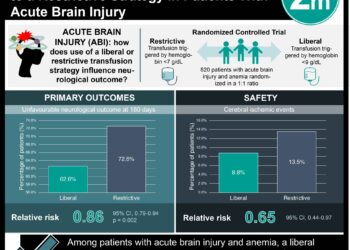Removing athletes from play following concussions may shorten recovery time
1. Athletes who continued play after sustaining concussions experienced longer recovery times than those who were removed.
2. Athletes removed from play exhibited improved neurocognitive function and fewer symptoms in the days and weeks following their concussions.
Evidence Rating Level: 2 (Good)
Study Rundown: Athletes, especially those participating in contact sports, are at risk for sustaining sport-related concussions (SRCs). Due to multiple factors, including under-diagnosis and resistance to removal from play following such injuries, concussed individuals are frequently not sidelined immediately. This could have serious cognitive consequences, particularly in maturing adolescents. Unfortunately, this is often underappreciated or ignored by the sports community. Evidence of a recovery benefit with immediate removal from play has the potential to encourage safer practice. To investigate whether such benefit exists, researchers conducted a prospective, repeated measures study to assess neurocognitive function and concussion symptoms in young athletes (ages 12 to 19) visiting a concussion specialty clinic. Results from Immediate Post-Concussion Assessment and Cognitive Testing (ImPACT) and in-person interviews suggested that athletes removed from play exhibited fewer total symptoms (e.g., headaches, dizziness, nausea, and fatigue) and better neurocognitive function, including verbal and visual memory, in the days and weeks following concussions. Further, removal of play status was found to be the strongest predictor of protracted (i.e., ≥21 days) recovery, with removed athletes recovering faster than those who continued to play. Limitations of this study included its inclusion of athletes participating in a wide range of sports with differences in the meaning of “continued play”, as well as failure to fully account for potential differences in the severity and duration of initial symptoms between groups. Despite these limitations, the findings suggest that diagnosing concussions on-field, removing concussed individuals immediately from play, and enforcing a strict policy on return to sport are important for minimizing recovery time and potential cognitive consequences.
Click to read the study, published today in Pediatrics
Relevant Reading: Sport-related concussion in children and adolescents
Study Author, R.J. Elbin, PhD talks to 2 Minute Medicine: Department of Health, Human Performance and Recreation/Office for Sport Concussion Research, University of Arkansas, Fayetteville, Arkansas.
“The findings highlight the need for better awareness among players, coaches and parents of the signs and symptoms of this injury- as well as the effects of ignoring those signs and symptoms- to prevent worse outcomes following a concussion.”
In-Depth [prospective cohort]: Participants included 69 athletes (ages 12 to 19) who visited a concussion specialty clinic within a 3-month period and met inclusion criteria. Learning disabilities and hyperactivity disorders were among reasons for exclusion, though most exclusions were due to lack of baseline data. SRC diagnosis required a known cause of injury and at least 1 on-field sign or post-injury symptom. Neurocognitive function and symptoms post-concussion were assessed by ImPACT and in-person interview at two consecutive clinical visits (visit 1: 1 to 7 days after injury; visit 2: 8 to 30 days after injury). Recovery time was standardized to be from the date of concussion to the date of medical clearance to resume full sports participation and was determined for 90% of participants. No significant differences in demographics or on-field markers of SRC severity and symptoms were noted between the “REMOVED” and “PLAYED” groups. However, despite being comparable at baseline, scores for verbal memory, visual memory, and total symptoms were significantly worse in the PLAYED group at both visits (visit 1: p ≤ 0.001 for all; visit 2: p ≤ 0.01 for verbal memory, p ≤ 0.001 for visual memory and total symptoms). Reaction time, while worse in the REMOVED group at visit 1 (p ≤ 0.001), was comparable between the groups by the second visit. A greater percentage of PLAYED athletes experienced protracted recovery (80% vs. 31%). Athlete removal from play was the strongest predictor of protracted recovery (adjusted odds ratio = 14.27, p = 0.001).
Image: PD
©2016 2 Minute Medicine, Inc. All rights reserved. No works may be reproduced without expressed written consent from 2 Minute Medicine, Inc. Inquire about licensing here. No article should be construed as medical advice and is not intended as such by the authors or by 2 Minute Medicine, Inc.









